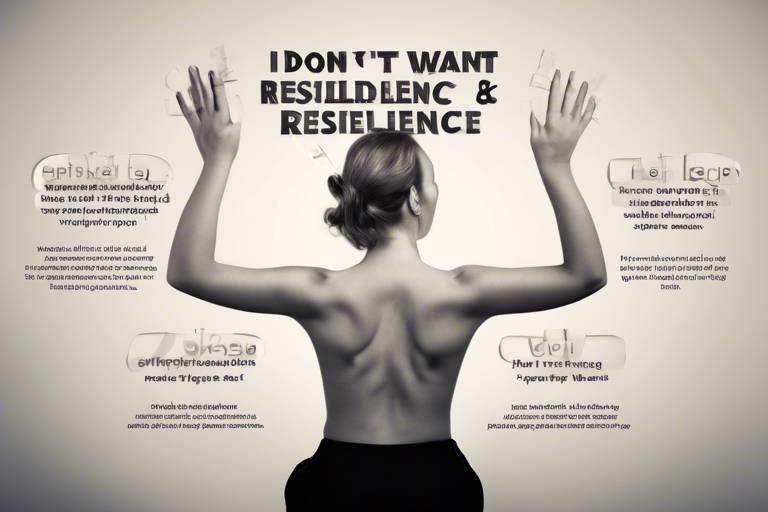How to Build Resilience - A Guide for Introverts
This article explores effective strategies for introverts to cultivate resilience, enabling them to navigate life's challenges with confidence and strength while embracing their unique qualities and preferences.
Resilience is more than just a buzzword; it's a crucial life skill that empowers individuals to bounce back from adversity. For introverts, who often prefer solitude and deep thinking, the journey to resilience can be uniquely challenging. Imagine resilience as a muscle that needs to be trained; the more you work on it, the stronger it becomes. This ability to rebound from setbacks is not only vital for personal growth but also essential in professional settings, where challenges can arise unexpectedly. Introverts might face specific hurdles, such as social anxiety or the pressure to conform to extroverted norms, making resilience all the more important. By understanding what resilience is and why it matters, introverts can better equip themselves to handle life's ups and downs.
Recognizing and leveraging personal strengths is crucial for building resilience. Introverts often possess unique qualities such as deep thinking, empathy, and creativity. These traits can serve as a solid foundation for overcoming obstacles. By taking the time to identify these strengths, introverts can foster a positive mindset that propels them forward. Think of it like finding hidden treasures within yourself; once you discover them, you can use them to navigate life's challenges more effectively. Consider the following ways to identify your strengths:
- Reflect on past experiences where you felt proud of your actions.
- Ask trusted friends or family members for feedback on what they see as your strengths.
- Take personality assessments or strength-finding quizzes to gain additional insights.
Self-reflection is a powerful tool for introverts. It allows you to pause, think, and assess your feelings, motivations, and strengths. By regularly engaging in self-reflection, you can create a clearer understanding of yourself, which is a vital step in building resilience. Techniques such as meditation, deep breathing, or simply spending time alone with your thoughts can be incredibly beneficial. Picture self-reflection as a mirror that helps you see your true self, allowing you to identify areas for growth and improvement.
Journaling is an effective method for self-reflection. It serves as a safe space where you can express your thoughts and emotions freely. By keeping a journal, you can process your experiences and track your emotional journey. This practice not only enhances your self-awareness but also helps in recognizing patterns in your behavior and feelings. Over time, journaling can become a powerful resilience-building tool, offering insights into how you respond to challenges and what strategies work best for you.
Mindfulness can significantly improve resilience. It encourages you to stay present and grounded, especially during challenging times. For introverts, mindfulness practices such as meditation, yoga, or simply taking a quiet walk can be particularly effective. These activities help to calm the mind and reduce anxiety, allowing you to approach difficulties with a clearer perspective. Think of mindfulness as a mental reset button — it gives you the space to breathe and regain your focus.
A strong support network is vital for resilience. Introverts may find it more challenging to reach out and form connections, but cultivating meaningful relationships is essential for emotional well-being. Consider surrounding yourself with individuals who understand and appreciate your introverted nature. These connections can provide encouragement and understanding during difficult moments. Building a support network can be as simple as joining a book club, engaging in online communities, or reconnecting with old friends who share your interests.
Establishing boundaries is essential for maintaining emotional well-being. For introverts, setting boundaries helps protect their energy and enhances resilience. It's about knowing your limits and communicating them effectively. When you set boundaries, you create a safe space for yourself, allowing you to recharge and focus on what truly matters. Think of boundaries as a protective shield that keeps you safe from overwhelm and burnout.
Effective communication is key to setting boundaries. Introverts may struggle with asserting their needs, but it’s crucial to express yourself confidently and assertively. This not only fosters healthier relationships but also helps others understand your limits. Practice using “I” statements to communicate your feelings, such as “I need some quiet time to recharge.” This approach minimizes defensiveness and opens the door for understanding.
Saying no is a critical skill for resilience. Recognizing personal limits and understanding that it’s okay to decline requests is essential for maintaining balance and well-being. Introverts often feel pressure to please others, but saying no can be empowering. It’s like drawing a line in the sand; it signifies that you value your time and energy. Remember, saying no to one thing often means saying yes to something more important — your peace of mind.
Q: What is resilience?
A: Resilience is the ability to bounce back from adversity and challenges, adapting positively to difficult situations.
Q: How can introverts build resilience?
A: Introverts can build resilience by identifying their personal strengths, practicing self-reflection, journaling, engaging in mindfulness practices, and building a supportive network.
Q: Why are boundaries important for introverts?
A: Boundaries help introverts protect their energy, maintain emotional well-being, and ensure they have the space needed to recharge.
Q: What are some effective ways for introverts to communicate their needs?
A: Introverts can communicate their needs effectively by using “I” statements, being clear and assertive, and practicing active listening.

Understanding Resilience
Resilience is often described as the ability to bounce back from adversity, but it’s so much more than that. It’s about adapting well in the face of stress, trauma, or tragedy. For introverts, who may naturally prefer solitude and introspection, understanding and cultivating resilience can be a game changer. Life throws challenges our way—whether it’s a tough day at work, a personal loss, or unexpected changes. Having resilience means you can face these challenges head-on, with confidence and strength.
Why is resilience particularly important for introverts? Well, introverts often process their emotions internally, which can sometimes lead to feeling overwhelmed in social or high-pressure situations. They might not always have the same level of external support as more extroverted individuals, making it essential to build a robust internal framework of resilience. This framework allows them to navigate life's ups and downs while honoring their unique qualities and preferences. Think of resilience as a mental fortress; it protects your inner peace and helps you recover from life's inevitable storms.
To break it down further, resilience can be defined by several key components:
- Emotional Awareness: Understanding your own emotions and how they affect your thoughts and behaviors.
- Adaptability: The ability to adjust to new situations and challenges without losing your ground.
- Optimism: Maintaining a hopeful outlook, even when facing difficulties.
- Support Systems: Building and relying on relationships that provide encouragement and understanding.
These components are interconnected and can significantly enhance an introvert's ability to cope with stress. By focusing on developing these areas, introverts can foster a resilient mindset that not only helps them manage challenges but also allows them to thrive. So, let’s dive deeper into how introverts can harness their unique strengths to build this resilience and emerge stronger from life's trials.

Identifying Personal Strengths
Recognizing and leveraging your personal strengths is a crucial step in building resilience, especially for introverts who often possess unique qualities that can be incredibly beneficial in navigating life's ups and downs. So, what exactly are personal strengths? They are the innate abilities and characteristics that make you who you are—your talents, skills, and positive traits that you can draw upon in challenging situations. For introverts, this might include deep thinking, empathy, creativity, and the ability to listen attentively. These traits can be powerful allies when facing adversity.
To truly harness these strengths, introverts need to embark on a journey of self-discovery. This process can involve various techniques that not only help you identify your strengths but also empower you to use them effectively. One effective approach is to engage in self-reflection. This can be as simple as taking time each week to ponder your experiences and feelings. Ask yourself questions like, “What situations made me feel energized?” or “When did I feel most competent?” These reflections can illuminate your strengths and how they can be applied in challenging circumstances.
Another method to identify your strengths is through feedback from others. Sometimes, we are so close to our own experiences that we overlook our abilities. By asking friends, family, or colleagues what they see as your strengths, you can gain valuable insights. You might be surprised to hear about qualities you didn’t even recognize in yourself! Consider creating a small table to record this feedback, which can serve as a visual reminder of your strengths:
| Strength | Source of Feedback |
|---|---|
| Empathy | Friend |
| Creativity | Colleague |
| Analytical Thinking | Family Member |
Additionally, consider engaging in activities that naturally highlight your strengths. For instance, if you enjoy writing, dedicating time to creative writing or blogging can not only bolster your confidence but also allow you to express your thoughts and feelings. This process can serve as a reminder of what you excel at and how those skills can aid in your resilience journey.
Ultimately, the key to building resilience lies in embracing your unique qualities. By recognizing your strengths, you can cultivate a positive mindset that empowers you to confront challenges head-on. Remember, resilience isn’t about never facing difficulties; it’s about how you respond to them. So, take the time to explore your strengths, and you’ll find that you have the tools necessary to bounce back from adversity with confidence.

Self-Reflection Techniques
Self-reflection is like holding up a mirror to your soul, allowing you to see not just your face but the emotions and thoughts that shape your experience. For introverts, who often thrive in quieter, more introspective environments, self-reflection can be a powerful tool in building resilience. It helps you understand your feelings, motivations, and the unique qualities that make you who you are. This understanding can empower you to face challenges with a renewed sense of confidence and strength.
One effective way to engage in self-reflection is through guided questions. These questions prompt you to think deeply about your experiences and feelings. Consider asking yourself:
- What challenges have I faced recently, and how did I respond?
- What strengths did I draw upon during those times?
- How can I apply what I learned from those experiences in the future?
By regularly reflecting on these questions, you can cultivate a deeper awareness of your personal growth and resilience. Another technique that many introverts find helpful is visualization. Imagine yourself navigating a challenging situation successfully. Picture the steps you would take, the emotions you might feel, and the outcome you desire. This mental rehearsal can boost your confidence and prepare you for real-life challenges.
Additionally, you might find it beneficial to engage in mind mapping. This technique involves creating a visual representation of your thoughts and feelings. Start with a central idea, such as a recent challenge, and branch out with your thoughts, feelings, and possible solutions. This not only organizes your thoughts but also reveals patterns and insights that can enhance your resilience.
Ultimately, self-reflection is about creating a dialogue with yourself. It’s about asking the right questions, exploring your inner landscape, and uncovering the strengths that you may not even realize you possess. Embrace this process, and you'll find that resilience isn't just a trait you have—it's a skill you can develop.
Q: How often should I practice self-reflection?
A: It's beneficial to practice self-reflection regularly, such as weekly or after significant experiences. Consistency helps build a habit and deepens your understanding of yourself.
Q: Can self-reflection help me in my professional life?
A: Absolutely! Self-reflection can enhance your decision-making, improve your relationships with colleagues, and help you identify areas for personal and professional growth.
Q: What if I struggle to find the right questions to ask myself?
A: Start with simple questions about your day-to-day experiences, and gradually move to deeper inquiries as you become more comfortable with the process.

Journaling for Growth
Journaling is not just a simple act of writing; it’s a powerful tool for personal growth, especially for introverts. When you take the time to put pen to paper (or fingers to keyboard), you create a safe space where you can explore your thoughts, feelings, and experiences without judgment. This practice allows you to process emotions and reflect on your life in a way that can significantly enhance your resilience. Think of journaling as a mental workout; just like lifting weights strengthens your muscles, writing regularly can fortify your mental and emotional state.
One of the greatest benefits of journaling is that it helps you gain clarity. When life throws challenges your way, it can be easy to feel overwhelmed. By writing down your thoughts, you can untangle the web of emotions and identify what’s truly bothering you. This clarity can lead to better decision-making and a more focused approach to overcoming obstacles. You might find yourself asking questions like, “What am I really feeling right now?” or “What steps can I take to move forward?” These questions pave the way for deeper self-understanding.
Moreover, journaling provides an opportunity to celebrate your victories, no matter how small. It's easy to overlook achievements in the hustle and bustle of daily life, but when you document them, you create a tangible record of your progress. This record serves as a reminder of your capabilities, reinforcing your self-esteem and resilience. You might even consider maintaining a section in your journal dedicated solely to gratitude—a practice that can shift your focus from what’s lacking in your life to what’s abundant.
To get started with journaling, you don’t need fancy notebooks or expensive pens. The key is to find a method that resonates with you. Here are a few tips to help you on your journey:
- Set a Regular Time: Choose a time that works for you, whether it’s in the morning to set intentions for the day or at night to reflect on what happened.
- Be Honest: Write without holding back. This is your private space, so let your thoughts flow freely.
- Experiment with Formats: Try different styles, such as bullet journaling, free writing, or prompts, to see what feels best.
Incorporating journaling into your routine can be a game-changer for building resilience. It’s not just about writing; it’s about creating a dialogue with yourself that fosters growth. As you navigate life’s ups and downs, your journal will become a trusted companion, helping you to reflect, learn, and ultimately thrive.

Mindfulness Practices
In today's fast-paced world, it's all too easy for introverts to feel overwhelmed by external stimuli and internal pressures. Mindfulness practices serve as a sanctuary, a way to retreat into oneself and cultivate a sense of calm amidst the chaos. By engaging in mindfulness, introverts can develop a deeper awareness of their thoughts and feelings, allowing them to respond to life's challenges with clarity and strength. Imagine standing in a busy marketplace, the noise and chaos swirling around you. Now, picture yourself taking a deep breath, focusing on the sensation of your feet on the ground, and letting the chaos fade into the background. This is the essence of mindfulness—anchoring yourself in the present moment.
One of the most effective mindfulness practices for introverts is meditation. Setting aside just a few minutes each day to meditate can significantly enhance emotional resilience. Whether you prefer guided meditations or silent reflection, the key is to find a practice that resonates with you. Start by finding a quiet space, closing your eyes, and focusing on your breath. Allow your thoughts to come and go without judgment, creating a mental space where you can observe rather than react. Over time, this practice can help you cultivate a sense of inner peace and resilience.
Another empowering mindfulness technique is body scanning. This practice involves mentally scanning your body from head to toe, paying attention to any areas of tension or discomfort. By bringing awareness to your physical sensations, you can release pent-up stress and foster a greater connection between your mind and body. As you practice body scanning, you might say to yourself, "I acknowledge this tension, and I choose to let it go." This simple affirmation can be incredibly liberating.
In addition to meditation and body scanning, incorporating mindful breathing into your daily routine can be transformative. Whenever you feel overwhelmed or anxious, take a moment to focus solely on your breath. Inhale deeply through your nose, allowing your abdomen to rise, and then exhale slowly through your mouth. Repeat this process several times, and notice how it calms your mind and body. You can practice mindful breathing anywhere—at home, in the office, or even while waiting in line.
To further enhance your mindfulness journey, consider integrating nature walks into your routine. Spending time outdoors can be incredibly grounding for introverts. As you walk, pay attention to the sights, sounds, and smells around you. Feel the texture of the ground beneath your feet and the breeze against your skin. This practice not only promotes mindfulness but also allows you to connect with the natural world, which can be a powerful source of inspiration and renewal.
Ultimately, the goal of these mindfulness practices is to create a toolkit that helps you navigate life's challenges with grace and resilience. By dedicating time to cultivate mindfulness, you're not just surviving; you're thriving. Remember, resilience is not about avoiding difficulties but about facing them head-on with a calm and centered mind. So, the next time life throws you a curveball, take a deep breath, ground yourself in the present, and respond with the strength that lies within you.

Building a Support Network
Creating a strong support network is like assembling a safety net beneath you; it provides a cushion during life's inevitable falls. For introverts, who often thrive in quieter, more intimate settings, building these connections can feel daunting. However, it’s crucial for fostering resilience and navigating challenges. Think of your support network as a garden: it requires nurturing, attention, and the right environment to flourish. The first step is to identify the types of support you need—be it emotional, practical, or even just someone to share a cup of coffee with.
Introverts often excel in one-on-one interactions, so consider reaching out to close friends or family members who truly understand you. These relationships can provide a safe space for you to express your feelings and thoughts without the fear of judgment. Additionally, you might want to explore local interest groups or online communities that align with your passions. Engaging in activities you love can naturally lead to connections with like-minded individuals, making it easier to form meaningful relationships.
Once you've identified potential connections, it’s essential to invest time and effort into nurturing these relationships. Regular check-ins, whether through text or casual meet-ups, can help solidify these bonds. Remember, building a support network is not just about receiving help; it’s also about being there for others. Offering support in return can create a reciprocal relationship that strengthens your network further.
Sometimes, introverts may hesitate to reach out due to the fear of being a burden. However, most people appreciate being asked for help and are often more than willing to lend an ear or offer assistance. You might be surprised at how many people are eager to support you. Here are a few strategies to help you build and maintain your support network:
- Be Authentic: Share your true self with others; authenticity fosters deeper connections.
- Start Small: Begin with one or two individuals and gradually expand your network.
- Utilize Social Media: Join online forums or groups that resonate with your interests.
- Attend Workshops or Classes: These can be excellent opportunities to meet new people in a structured environment.
As you cultivate your network, don’t forget the importance of diversity within it. Having a mix of personalities and perspectives can enrich your experience and provide you with a broader range of insights and support. Remember, building a support network is a journey, not a destination. It takes time, patience, and a willingness to step outside your comfort zone. But the rewards—greater resilience, emotional support, and a sense of belonging—are well worth the effort.

Setting Healthy Boundaries
Setting healthy boundaries is not just a nice-to-have; it's a necessity for emotional well-being, especially for introverts. Imagine trying to fill a cup with water while there are holes in the bottom; no matter how much you pour in, it just keeps draining away. That’s what happens when you don’t establish boundaries. You might find yourself feeling drained, overwhelmed, and unable to cope with the demands of life. Boundaries are like the walls of a fortress, protecting your inner peace and helping you maintain your energy levels.
For introverts, who often recharge in solitude, it's essential to recognize where their limits lie. Setting boundaries means saying “no” when necessary, prioritizing self-care, and ensuring that your needs are met without feeling guilty or selfish. It's about creating a safe space where you can thrive without the constant pressure of external expectations. By clearly communicating your needs, you’re not only taking care of yourself but also teaching others how to treat you.
When it comes to establishing these boundaries, it’s important to remember that they can be both physical and emotional. Physical boundaries might involve determining how much time you spend in social situations, while emotional boundaries relate to how much you share with others. For instance, you might choose to engage in social gatherings for a limited time, allowing yourself to leave when you start to feel drained. This way, you can enjoy the company of others without sacrificing your well-being.
To effectively set these boundaries, consider the following strategies:
- Be Clear and Direct: When communicating your boundaries, be straightforward. Instead of hinting or being vague, clearly state your needs.
- Practice Assertiveness: It’s okay to assert your boundaries. You have every right to protect your time and energy.
- Stay Consistent: Consistency reinforces your boundaries. If you set a boundary, stick to it; this helps others understand and respect your limits.
Establishing boundaries might feel uncomfortable at first, especially if you’re not used to asserting your needs. However, think of it as building a muscle; the more you practice, the stronger you become. Start with small steps, like declining an invitation when you need some alone time, and gradually work your way up to more significant boundaries. Remember, it’s perfectly okay to prioritize your well-being over the expectations of others.
In the end, setting healthy boundaries is about creating a life that aligns with your values and needs. It empowers you to take control of your emotional landscape, allowing you to navigate challenges with greater resilience. When you respect your own limits, you teach others to do the same, paving the way for healthier relationships and a more balanced life.

Communicating Needs Effectively
When it comes to building resilience, one of the most critical skills for introverts is the ability to communicate their needs effectively. This can often feel daunting, especially when you're naturally inclined to avoid confrontation or feel uncomfortable expressing your feelings. However, learning to articulate your needs is not just about speaking up; it's about fostering healthier relationships and ensuring that your emotional well-being is prioritized. Think of it as planting seeds in a garden; the more you nurture your needs, the more vibrant and resilient your garden will grow.
To start, it’s essential to understand that communication is a two-way street. It’s not just about what you say, but also how you say it. Introverts often have a wealth of thoughts and feelings swirling inside, but translating that into words can be a challenge. One effective approach is to practice assertive communication, which allows you to express your needs clearly and respectfully. This means using “I” statements, which focus on your feelings rather than placing blame. For example, instead of saying, “You never listen to me,” try “I feel overlooked when my opinions aren’t considered.” This subtle shift can make a world of difference in how your message is received.
Additionally, timing plays a crucial role in effective communication. It’s important to choose the right moment to express your needs. If you’re feeling overwhelmed or stressed, it might not be the best time to have a deep conversation. Instead, wait until you feel calm and collected. This way, you can articulate your thoughts more clearly and listen to the other person’s perspective without feeling defensive. A great strategy is to schedule a time to talk when both parties are relaxed and open to discussion. This can be as simple as saying, “Can we chat about something that’s been on my mind? I’d appreciate your input.”
Another vital aspect of communicating needs is to be specific. General statements can lead to misunderstandings, so it’s crucial to express exactly what you need. For instance, instead of saying, “I need more support,” you might specify, “I would appreciate it if you could check in with me at least once a week to see how I’m doing.” This clarity not only helps others understand your needs better but also sets a clear expectation of what you’re looking for.
Lastly, remember that communication is a skill that improves with practice. Start small by expressing your needs in low-stakes situations, like asking a friend to hang out on a specific day or requesting a quieter environment when you're feeling overwhelmed. As you build your confidence, you’ll find it easier to tackle more significant conversations. And don’t forget to celebrate your progress! Each time you communicate your needs, you’re reinforcing your resilience and taking steps toward emotional well-being.
- Why is it important for introverts to communicate their needs?
Effective communication helps introverts build healthier relationships, reduces misunderstandings, and enhances emotional well-being. - How can I practice assertive communication?
Start by using “I” statements, focusing on your feelings, and being specific about your needs. - What if the other person doesn’t understand my needs?
Be patient and willing to explain your feelings further. Sometimes, it takes time for others to grasp your perspective. - Can I communicate my needs in writing?
Absolutely! Writing can be a great way for introverts to express their thoughts clearly without the pressure of face-to-face conversation.

Knowing When to Say No
Knowing when to say "no" is an essential skill for anyone, but for introverts, it can sometimes feel like an uphill battle. The pressure to conform to social expectations and the fear of disappointing others can make it challenging to assert personal boundaries. However, mastering this skill is crucial for maintaining emotional balance and enhancing resilience. Imagine your energy levels as a battery; if you keep draining it without recharging, you'll eventually find yourself depleted and overwhelmed. So, how can introverts learn to say no without feeling guilty or anxious?
First and foremost, it's important to recognize that saying no does not make you a bad person. In fact, it can be an act of self-care. One of the most effective ways to approach this is by evaluating your own priorities and commitments. Ask yourself questions like: "Is this task aligned with my goals?" or "Will this bring me joy or fulfillment?" If the answer is no, then it's okay to decline. By prioritizing your own needs, you are not only protecting your energy but also allowing yourself to invest more fully in the things that truly matter to you.
Another helpful strategy is to practice assertive communication. This doesn't mean being rude or dismissive; instead, it's about expressing your needs clearly and confidently. For instance, if a colleague asks you to take on an extra project that you simply cannot handle, you might say, "I appreciate the offer, but I currently have too much on my plate to give this the attention it deserves." This way, you’re being honest about your limitations while also showing respect for the other person's request.
It can also be beneficial to prepare yourself with a few polite phrases that you can use when declining an invitation or request. Here are some examples:
- "Thank you for thinking of me, but I need to focus on my current commitments."
- "I’m flattered by the invitation, but I have prior obligations that I cannot change."
- "I really appreciate the offer, but I need to prioritize my well-being right now."
Additionally, recognizing your personal limits is key. Each individual has a unique threshold for how much they can handle before feeling overwhelmed. Take some time to reflect on your own limits and respect them. If you find yourself frequently stretched too thin, it may be a sign that you need to start saying no more often. Remember, every time you say yes to something that drains you, you are inadvertently saying no to something that could uplift you.
Lastly, it’s important to remember that saying no can actually strengthen your relationships in the long run. When you are honest about your capacity, people will come to respect your boundaries. They’ll appreciate your authenticity, and your relationships will be built on mutual understanding rather than obligation. So, the next time you feel pressured to say yes, take a moment to consider your own needs and remember that it's perfectly okay to prioritize yourself.
- Why is it hard for introverts to say no? Introverts often feel a strong sense of empathy and may worry about disappointing others, which makes it difficult to decline requests.
- How can I practice saying no? Start by role-playing scenarios with a trusted friend or writing down polite phrases you can use when declining.
- Is it okay to say no to family and friends? Absolutely! Your well-being is important, and true friends and family will understand your need to set boundaries.
- What are the benefits of saying no? Saying no can lead to reduced stress, better time management, and healthier relationships, as it allows you to focus on what truly matters to you.
Frequently Asked Questions
- What is resilience and why is it important for introverts?
Resilience is the ability to bounce back from challenges and adversity. For introverts, building resilience is crucial as they often face unique situations that can be draining or overwhelming. By cultivating resilience, introverts can navigate personal and professional hurdles with greater confidence and strength, allowing them to embrace their unique qualities while thriving in various environments.
- How can introverts identify their personal strengths?
Introverts can identify their personal strengths through self-reflection techniques such as journaling and mindfulness practices. Taking time to assess their feelings, motivations, and past experiences helps them recognize the qualities that make them unique. By focusing on these strengths, introverts can leverage them to overcome obstacles and foster a positive mindset.
- What role does journaling play in building resilience?
Journaling serves as a powerful tool for self-reflection and growth. For introverts, keeping a journal allows them to process their experiences and emotions, helping them gain clarity and insight. This practice not only enhances their understanding of themselves but also equips them with the ability to respond to challenges more effectively, thereby building resilience over time.
- How can introverts build a support network?
Building a support network involves cultivating meaningful relationships with individuals who understand and appreciate introverts' unique qualities. Introverts can start by seeking out like-minded individuals, engaging in activities that resonate with them, and being open to forming connections. A strong support network provides encouragement and understanding, which is essential during tough times.
- Why is setting healthy boundaries important for introverts?
Setting healthy boundaries is vital for introverts to protect their energy and emotional well-being. By clearly defining their limits, introverts can prevent burnout and maintain a sense of balance in their lives. This practice enhances resilience, as it allows them to focus on their needs and engage in activities that replenish their energy.
- What tips can help introverts communicate their needs effectively?
Introverts can communicate their needs effectively by practicing assertiveness and being clear about their boundaries. It's helpful to use "I" statements to express feelings and needs without sounding accusatory. Additionally, choosing the right time and setting for these conversations can make a significant difference in how their messages are received.
- How can saying no contribute to resilience?
Saying no is a critical skill for introverts as it helps them recognize their personal limits and prioritize their well-being. By learning to say no, introverts can avoid overcommitting themselves and maintain a healthy balance in their lives. This ability to assertively decline requests ultimately supports their resilience by allowing them to focus on what truly matters to them.



















